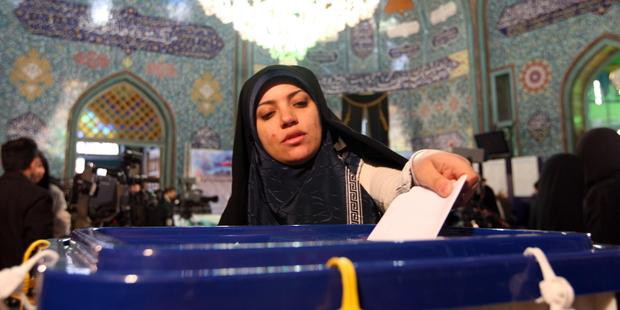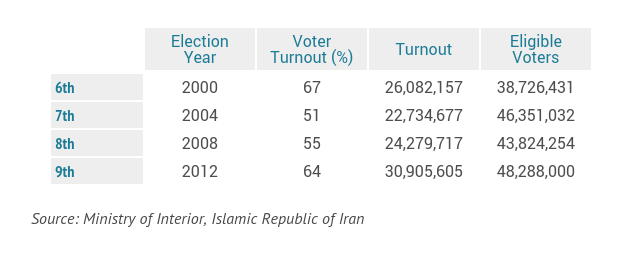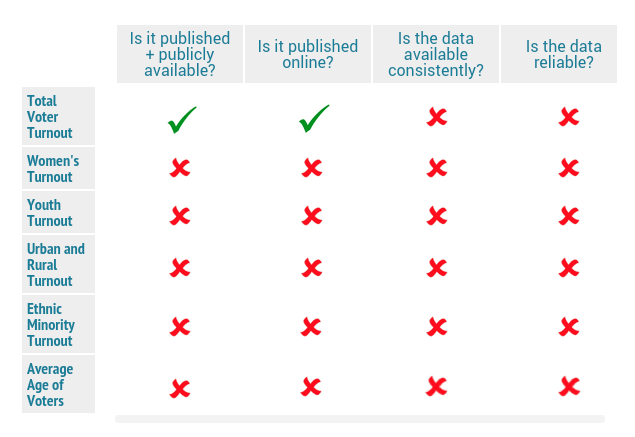Why publishing transparent election data is advantageous for the Islamic Republic of Iran
Elections provide an opportunity for citizens to have a say in what they want to change about their governments. In Iran’s hybrid system of democracy and theocracy, electoral participation is particularly important for the government’s sense of legitimacy with its citizens.
Considering Iran’s upcoming parliamentary election in February 26, 2016,Majlis Monitor took a closer look at voter participation in the last few parliamentary elections in the country. Iran’s parliament, also known as Majlis, is elected every four years by Iranian citizens.
Below is Iran’s official voter participation numbers for the last four Majlis elections:
A closer look at the data revealed some anomalies in the numbers pertaining to the 2012 Majlis election:
- The Ministry of Interior announced that 48,288,000 people were eligible to vote, but this number was challenged as too low.
- The Ministry initially reported the turnout at 26,472,000 (which is less than 55%), while simultaneously announcing a 64% turnout.
- Turnout exceeded 100% in some districts.
- The Ministry waited more than 11 days before announcing voter turnout numbers, which is considered unusual in Iran.
The political situation of the time suggests that the government had an incentive to publish high turnout numbers, even if inaccurate. Since the 2009 public demonstrations against voter fraud in that year’s presidential election, the government has been concerned about its legitimacy, and citizens have been concerned about the electoral process. As such, during the 2012 Majlis election, the government conducted a massive campaign encouraging citizens to vote in an effort to revive their lost legitimacy amongst citizens. Iran’s Supreme Leader Ayatollah Ali Khamenei, actively expressed a desire to achieve “record voter participation” to show the world that the Iranian government enjoys popular support from its citizens. Meanwhile, the election was boycotted by a considerable number of candidates, namely Iran’s reformists, leaving voters with fewer choices.
Is transparency in publishing voter turnout advantageous for the Iranian government?
Absolutely.
An advantage of publishing accurate election data, even if unfavourable for the government, is that it builds citizen trust in the democratic element of Iran’s hybrid system. Even if the voter is unhappy with the existing political state of affairs or the choices of candidates, they at least have the opportunity to voice their opinion through non-participation.
Publishing unreliable data from the 2012 Majlis election worsened the Iranian public’s trust in their government. The government’s handling of elections, and the inaccurate data in particular, was widely questioned in the media and by journalists.
It is true however, that reporting low voter turnout may have triggered criticism, especially from the “enemies” of the Islamic Republic — that voters feel too disenfranchised from 2009 to engage in elections. Yet, an alternative approach to tackle this problem would have been to continue encouraging citizens to vote, and to take steps toward modernizing the electoral system to give citizens a sense of change.
Why is publishing election data relevant to government legitimacy?
Voter participation can be indicative of the level of citizen support for a government and its associated political institutions. If a government is worried about losing public support, publishing low voter turnout numbers will communicate this trend domestically and internationally, showcasing the fact that eligible voters are politically apathetic and/or dissatisfied with the pool of choices they have been given.
The extent of the information published, and how it is published, is also relevant to government legitimacy. Detailed voter turnout data for instance, is necessary for assessing the inclusiveness of elections. These numbers should ideally be published during the voter registration period and after the election, to give the government and citizens an idea of which segments of society are being engaged. Whether the data is publicly promoted and available on an accessible platform, is also indicative of the government’s proactive efforts in attaining public trust.
Is the Islamic Republic currently being proactive about legitimizing its elections to its citizens? Majlis Monitor looked at what kind of election data from the past four Majlis elections were published and accessible:
As seen above, a detailed breakdown of voter turnout is unavailable. Voter turnout is the only data provided, but has been inconsistent from election to election (i.e. the data is not provided in the same format, or it is not regularly available). As discussed earlier, even the accuracy of this data is under speculation.
Recommendations for the 2016 Majlis election
A central point for the Islamic Republic to consider for the upcoming Majlis election is that members of Iran’s Majlis are closer to the everyday issues that impact Iranians. Transparency in Majlis elections has the potential to give Iranians a sense of control over their everyday problems.
By continuing to not publish detailed, timely and accurate election data, the government only demonstrates to its citizens that it is not being proactive about improving its electoral system. Doing so does not require widespread social, institutional and systemic reform in the Iranian government. As a hybrid system of theocracy and democracy, being proactive about modernizing the democratic elements of the system — like its elections — can only be advantageous to the government for gaining public trust.
In a modern age of information, tampering with the truth is an ineffective strategy to gaining legitimacy with citizens. As demonstrated by the 2012 Majlis election, the government’s current approach is actually highly counterproductive.
Transparently publishing detailed and accessible election data can be a starting point for modernizing Iran’s electoral system. The public must also be made aware of these initiatives through efficient public promotion. Overall, this strategy will serve as an indication that the government is interested in managing the democratic elements of its hybrid system transparently. The upcoming 2016 Majlis election is an ideal opportunity for the government to gain the public’s trust in its electoral processes.


